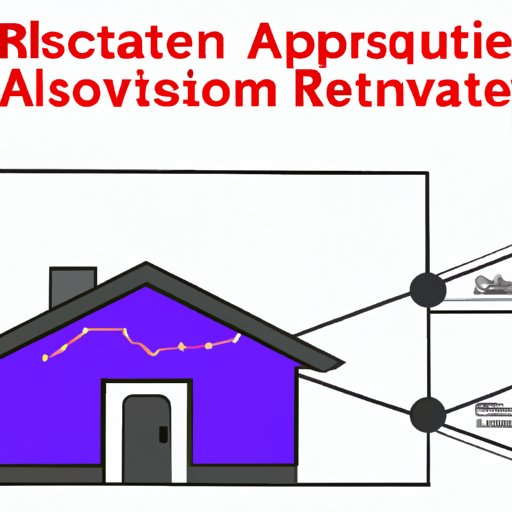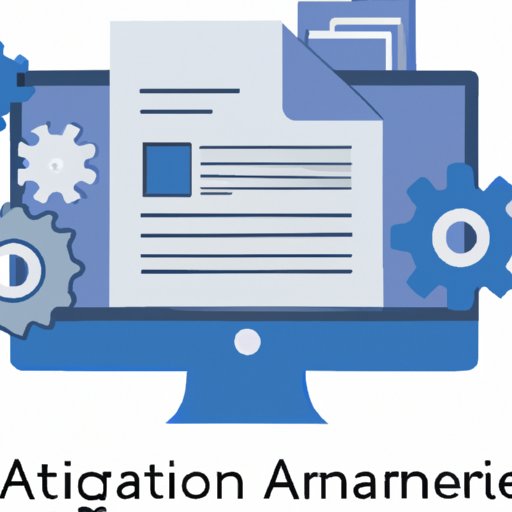Introduction
Automation is a process that involves using technology to automate manual tasks. This can help businesses become more efficient and reduce costs. In the real estate industry, automation can be used to streamline processes and improve customer service. Automating real estate can help companies save time and money, as well as increase productivity and accuracy. In this article, we will explore how to automate real estate and the various benefits and strategies associated with it.

Developing Automation Platforms for Real Estate Companies
An automation platform is a software system that automates different tasks within an organization. It can be used to monitor and manage a variety of activities, such as property listings, tenant applications, sales transactions, and maintenance requests. Automation platforms can be tailored to the specific needs of a real estate company, allowing them to streamline their processes and save time and money.
There are several types of automation platforms available for real estate companies. These include cloud-based solutions, on-premise solutions, mobile solutions, and web-based solutions. Each type of solution has its own advantages and disadvantages, so it’s important to consider which type of platform best fits the needs of the company. For example, cloud-based solutions are typically more cost-effective than on-premise solutions, but they may not provide the same level of security.
Developing an automation platform requires careful planning and research. Companies should consider their specific needs and goals before selecting a platform. They should also research different vendors and compare features and prices to find the right solution for their business. Once the platform is selected, companies should create detailed plans for implementing it and training staff.

Leveraging AI and Machine Learning to Automate Property Management
Artificial intelligence (AI) and machine learning are technologies that enable computers to learn from data and make decisions without human intervention. AI and machine learning have numerous applications in the real estate industry, including property management. AI and machine learning can be used to automate tasks such as tenant screening, rent collection, and maintenance scheduling.
The benefits of using AI and machine learning for property management are numerous. AI and machine learning can help reduce costs, improve accuracy, and speed up processes. Additionally, AI and machine learning can help improve customer service by providing tenants with personalized experiences. Lastly, AI and machine learning can help identify trends and patterns in data, allowing companies to make better decisions.
Implementing AI and machine learning for property management requires a structured approach. Companies should start by identifying areas where AI and machine learning can be applied. Next, they should develop algorithms and models to automate the identified tasks. Finally, they should test and refine the algorithms and models to ensure they are performing optimally.
Utilizing Automated Lead Generation Systems
Automated lead generation systems are software programs that generate leads for real estate companies. These systems use algorithms to identify potential customers based on criteria such as location, budget, and other preferences. Automated lead generation systems can help real estate companies save time and money, as they do not need to manually search for potential customers.
The benefits of automated lead generation systems are numerous. These systems can help companies quickly identify leads, allowing them to focus their resources on converting those leads into customers. Additionally, automated lead generation systems can help companies target specific audiences, allowing them to tailor their messaging to those audiences. Lastly, automated lead generation systems can help companies track and analyze data, allowing them to optimize their campaigns for better results.
Implementing an automated lead generation system requires careful planning and research. Companies should select a system that meets their specific needs and goals. Additionally, they should develop a strategy for using the system, including setting up targeting criteria and tracking performance. Finally, they should test and refine the system to ensure it is performing optimally.
Optimizing Online Advertising and Marketing Strategies
Online advertising and marketing are essential components of any real estate company’s business model. These strategies allow companies to reach potential customers and promote their services. Automation can help companies optimize their online advertising and marketing strategies, allowing them to reach more people in less time.
The benefits of leveraging automation for online advertising and marketing are numerous. Automation can help companies save time and money, as they do not have to manually set up campaigns. Additionally, automation can help companies target specific audiences, allowing them to tailor their messaging to those audiences. Finally, automation can help companies track and analyze data, allowing them to optimize their campaigns for better results.
Implementing automated online advertising and marketing strategies requires careful planning and research. Companies should select a platform that meets their specific needs and goals. Additionally, they should develop a strategy for using the platform, including setting up targeting criteria and tracking performance. Finally, they should test and refine the platform to ensure it is performing optimally.

Creating Automated Strategies for Home Appraisals
Home appraisals are assessments of a home’s value, typically conducted by professional appraisers. Automation can be used to streamline the home appraisal process, making it faster and more accurate. Automation can also help reduce costs and improve customer service.
The benefits of automating home appraisals are numerous. Automation can help reduce costs, as companies do not need to hire appraisers. Additionally, automation can help improve accuracy, as it eliminates the possibility of human error. Finally, automation can help streamline the process, allowing companies to complete appraisals faster.
Implementing automated home appraisal strategies requires careful planning and research. Companies should select a platform that meets their specific needs and goals. Additionally, they should develop a strategy for using the platform, including setting up criteria and tracking performance. Finally, they should test and refine the platform to ensure it is performing optimally.
Integrating Automated Payment and Billing Processes
Automated payment and billing processes are systems that allow customers to pay for products and services electronically. These systems are becoming increasingly popular in the real estate industry, as they can reduce costs, improve accuracy, and speed up processes.
The benefits of automating payment and billing processes are numerous. Automation can help save time and money, as companies do not need to manually process payments. Additionally, automation can help reduce errors, as it eliminates the possibility of human error. Finally, automation can help improve customer service, as customers can easily pay for products and services.
Implementing automated payment and billing processes requires careful planning and research. Companies should select a platform that meets their specific needs and goals. Additionally, they should develop a strategy for using the platform, including setting up criteria and tracking performance. Finally, they should test and refine the platform to ensure it is performing optimally.

Implementing Automated Document Management Systems
Automated document management systems are software programs that allow companies to store, organize, and share documents electronically. These systems are becoming increasingly popular in the real estate industry, as they can reduce costs, improve accuracy, and speed up processes.
The benefits of automating document management are numerous. Automation can help save time and money, as companies do not need to manually enter data. Additionally, automation can help improve accuracy, as it eliminates the possibility of human error. Finally, automation can help improve customer service, as customers can easily access documents.
Implementing automated document management systems requires careful planning and research. Companies should select a platform that meets their specific needs and goals. Additionally, they should develop a strategy for using the platform, including setting up criteria and tracking performance. Finally, they should test and refine the platform to ensure it is performing optimally.
Conclusion
Automation is becoming increasingly popular in the real estate industry, as it can help companies save time and money, as well as improve accuracy and customer service. In this article, we explored how to automate real estate and the various benefits and strategies associated with it. We discussed developing automation platforms for real estate companies, leveraging AI and machine learning to automate property management, utilizing automated lead generation systems, optimizing online advertising and marketing strategies, creating automated strategies for home appraisals, integrating automated payment and billing processes, and implementing automated document management systems.
Overall, automation can offer numerous benefits to real estate companies. By leveraging automation, companies can save time and money, as well as improve accuracy and customer service. As technology continues to develop, automation is likely to become even more prevalent in the real estate industry.
(Note: Is this article not meeting your expectations? Do you have knowledge or insights to share? Unlock new opportunities and expand your reach by joining our authors team. Click Registration to join us and share your expertise with our readers.)
